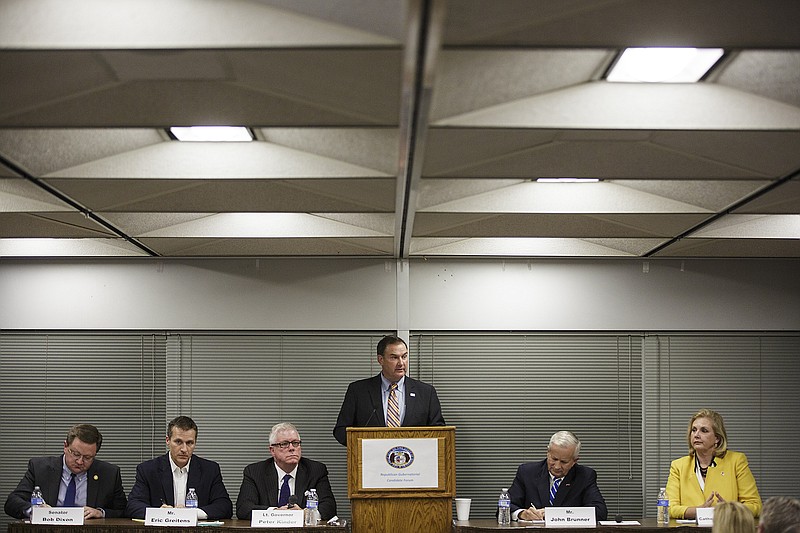One year before Missouri voters make their final election choices, the five Republicans who have launched campaigns to be the state's next governor shared a stage for the first time, explaining some of their ideas and some of their differences.
However, there was a lot of similarities among the statements made Tuesday night by Catherine Hanaway, John Brunner, Eric Greitens, state Sen. Bob Dixon and current Lt. Gov. Peter Kinder.
In a debate at Missouri Farm Bureau's Jefferson City headquarters, all five favored smaller government, lower taxes, fewer regulations on businesses and agriculture, and implementation of a right-to-work law that would prohibit union contracts requiring all employees to pay union dues.
On the most local of the six questions the candidates answered, all agreed state government employees should be paid better - but disagreed on how to accomplish that goal.
• Dixon has sponsored a proposal to tie state employee pay raises to those suggested by the Citizens Compensation Commission for lawmakers, statewide-elected officials and judges.
"That would be tied to the consumer price index," he explained. "If you don't have good help, and you don't keep good help, you cannot serve the people."
He would raise money for pay raises by finding more ways to streamline state operations.
• As he said with most of the night's discussions, Greitens pointed to his non-political, Navy SEAL and business and charity operator backgrounds.
"You have to be able to define, for every agency in government, "What is your mission' and, for every line item in the budget, "What results did you produce for the people of Missouri?'" he said.
Greitens would provide raises to state employees who "produce results," and would make more money available by changing to a "zero-based" budgeting process and cutting out instances of waste.
• Kinder noted the lieutenant governor's office "has the smallest budget of the six constitutional officers elected by the people," that he has reduced his appropriations and still "returned money unspent out of that office allocation."
Getting all state agencies, boards and commissions to reduce their expenses should provide more money to "do better by state employees who are lowly paid and who have not had adjustments that have kept pace with inflation," he said.
• Throughout the debate, businessman John Brunner cited the successful operations of his family manufacturing business.
"It's a principle I learned in the Marine Corps: "You take care of your troops, they take care of the mission,'" he explained. "Compensation is directly related to productivity and motivation."
Things would be better if we ran "this state like a business," he said.
• Hanaway said Missouri government has "too many state employees for the size of state that we are and too big a government."
There are a "number of ways that we can shrink the government," she said, including contracting some government services to private operators, and everyone would benefit.
All five argued Gov. Jay Nixon's leadership has taken Missouri in the wrong direction, and all suggested they will do a better job than current Attorney General Chris Koster, the likely Democratic candidate for governor in next year's race.
Tuesday's 90-minute debate featured six questions prepared in advance by the sponsors, but not shared with the candidates until asked during the debate.
Besides the state pay raise, the questions included how to improve health care and Internet services in rural areas, transportation funding, competing with neighboring states for business expansion and making Missouri "entrepreneur-friendly."
Each candidate also was given time to make opening and closing statements.
David Turner, a Missouri Democratic Party spokesman, said in a news release after the GOP debate ended: "When it comes to who will be fighting for Missouri's middle class and working families, there is simply no way I could have drawn a clearer contrast. ... Tonight, Republicans made it clear they would rather fight for far-right ideology rather than what's best for the state."
Formal filing for the offices begins in February, and the August primary election will weed the field down to one candidate for each party.

